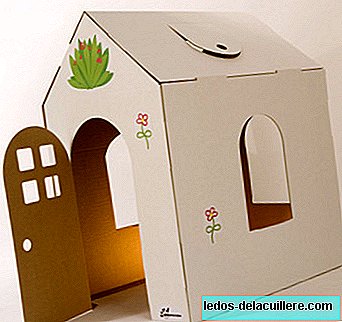
Both at home and at school level, praising the good gestures, achievements or progress of children can help them move forward, since in some ways it reinforces what they are doing.
It is very common that both the reprimands and the elect at school are given publicly, with the whole class watching, and using the message so that the rest of the students listen to it and see where to aspire, or where not to. There are those who doubt the effectiveness of this method and suggest that they communicate privately to the students, because it can happen that a child who is congratulated in public can then suffer the consequences of their peers. When in doubt, we will try to answer the question: Praise at school, better in public or in private?
It seems to be indifferent
We read in Research Digest, a blog of the British Psychological Society, that the first study has been carried out that tries to differentiate which is better, whether to congratulate the children in public or to do it in private, and it seems that the researchers have concluded that it does not matter, that it is indifferent to do it one way or another. I have my own opinion about it, but I will tell you in the end.
The study was done in public schools, with high school students (aged 14 to 16). The four classes studied were formed by children of both sexes, being classes of between 16 and 25 students, with American and African-American children. English was being taught in three of the classes, while in another algebra. The teachers were explained how to praise the children: praise should be linked to good behavior, should be immediate and it should be clear to which student he was addressing. During the class, the teachers had a bell on their belt that, every two minutes, gave them the signal to congratulate one of their students. Sometimes they did it publicly, loudly, and sometimes privately, with a whisper in the ear or a pat on the shoulder. To compare, there were classes in which teachers should not do anything special, but simply teach the class as they usually did.
The evaluation was carried out by trained observers who remained 20 minutes in each class, analyzing the behavior and reactions of the students in the different conditions. They saw that the compliments served to increase by 31% attention to the teacher and interest in reading. The improvement did not vary significantly if the praise was public or private. They also saw that when compliments of any kind were frequent bad behavior was reduced by 20%.
The authors concluded that both types of praise were effective tools and recommended them in secondary education.
And on a social level?
I have the impression that they have left the most important thing, what happens outside the classroom. One thing is what you see in class, the behavior secondary to a public or private praise, which can serve as motivation for a student or as a push to tell you that "you are on the right track" and another is what can happen next to social level. When I went to school I remember that there were two or three girls, those who received the nickname of "nerds" for getting good grades, that without being especially pedantic, because they were not, they ended up receiving the hatred and teasing of others. Many of the less capable laughed many for disaster, and most capable, for brilliants. Faithful reflection of adult society, children behaved like destructive elements of the different that tried to eliminate everything that was below or above those considered "children of the heap."
And when the teachers decided to perform a public praise, I don't even tell you: "You have no future, I have never seen a class like this, you will not get to anything ... it would be better to look more at Fulanita and Menganita, who never have bad words and are students excellent. " All eyes were on Fulanita and Menganita, hated and repudiated for being so perfect. And as I say, mediocre people do not try to be better nor are they able to value the excellence of the brilliant, just try to end by criticism with that excellence to, making them fall, bring them closer to their level.
Come on, that praise in public can be positive, but depending on the context they can be terribly negative, because the rest of the group, often cruel, can expel those people for considering them rare or even traitorous (being so good, others seem more bad).
Similarly, reprimand in public or private should be valued, as it is terribly humiliating to be corrected in front of others, in front of those who claim to be accepted. Do you know any adult who, working, prefers his boss to tell him what he does wrong in front of the other workers? Because I don't know anyone like that. And if there is a boss who does it that way, surely those affected will say that "I think it is very good that he tells me what I do not do well to be able to improve in my duties, but please, tell me privately and not in front of others. "
It is usual, however, to throw the children in front of others. In fact, I have done it on more than one occasion as a father, precisely because it is usual, because it is hard for us to see that this, which has always been done, It is disrespectful towards children. I am working on it and always try not to. The problem is that many times the "public" is affected by what my son is doing (if he is fighting with another child) and sometimes it is difficult not to release all the verbiage in situ and save it for a little while later.
As far as I was concerned, telling a child in public what he does wrong can also be negative, worse than if we tell him in private, precisely because many times children do not even know that they are doing badly, or that they could do things better. and for the humiliation that it can suppose and how disrespectful it is on our part. But this is also treatable. If you have seen Professor Toshiro Kanamori's magnificent documentary "Thinking of others", at one point in class the teacher decides to publicly incriminate a child's behavior. Peers react and also give their opinion, creating a framework of solutions and growth paths from a conflict.
The difference, I guess, is that what we see in that documentary is a climate of communication and trust between children and teacher somewhat away from what we are used to seeing, and the relationship between children seems so solid that reproving something to a child in a public way does not seem enough to diminish their self-esteem or harm their relationship with others. Come on, in the end it all depends a little on the situation, on the child, on how it relates to others and on what is the adult's relationship with all children or students.
Beware of praise and awards

I talked about it 5 years ago: prizes and rewards can be as harmful as punishment. I gave that headline and I stayed so wide, basically because the awards are cousins-brothers of the punishments, having as a result drive the child away from real motivation.
An excessive prize, an exaggerated praise or the sum of many small compliments and congratulations they can make the child dependent on them. Surely many of you know children who hang out saying "look dad, what I do", waiting for our "very good!". It is normal that they want to show us their achievements, eye, but it may not be if it is something continuous and if every small advance must receive our approval. Basically because they will no longer do things to satisfy themselves with their successes, but to satisfy us.
Well, in the classroom the same thing happens, students cannot live pending praise. They cannot try to do things to please the teacher, for that purpose, because the motivation is not intrinsic to the child, but totally extrinsic, slave of congratulations. That is why adult praises should be offered to children very cautiously. It is very good that we value the effort, that they know that we care and we like to see how they apply to do things, that they know that we encourage them to move forward, but we must be careful not to make them fall in need of our approval keep going. In other words, they must have the motivation to achieve things, and we only have to give them, if we consider it appropriate, "you are doing well, keep it up." If we get the final motivation to be our "congratulations, you got it", we were wrong, because The prize should not be our judgment, but its achievement.
Photos | Thinkstock
In Babies and more | Exaggerated praise can be counterproductive in children with low self-esteem, Achieving your goal will not be easy, but we will be by your side, Trying to ensure that our children are not mediocre adults












